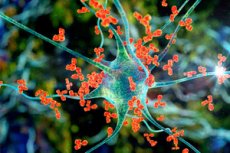Nye publikasjoner
Kunstig intelligens vil forbedre prognose og behandling av autoimmune sykdommer
Sist anmeldt: 02.07.2025

Alt iLive-innhold blir gjennomgått med medisin eller faktisk kontrollert for å sikre så mye faktuell nøyaktighet som mulig.
Vi har strenge retningslinjer for innkjøp og kun kobling til anerkjente medieområder, akademiske forskningsinstitusjoner og, når det er mulig, medisinsk peer-evaluerte studier. Merk at tallene i parenteser ([1], [2], etc.) er klikkbare koblinger til disse studiene.
Hvis du føler at noe av innholdet vårt er unøyaktig, utdatert eller ellers tvilsomt, velg det og trykk Ctrl + Enter.

En ny avansert algoritme for kunstig intelligens (KI) kan føre til mer nøyaktige og tidligere prediksjoner og nye behandlinger for autoimmune sykdommer, der immunsystemet feilaktig angriper kroppens egne friske celler og vev. Algoritmen analyserer den genetiske koden som ligger til grunn for disse tilstandene for å mer nøyaktig modellere hvordan gener assosiert med spesifikke autoimmune sykdommer uttrykkes og reguleres, og for å identifisere ytterligere risikogener.
Arbeidet, utviklet av et team av forskere ved University of Pennsylvania College of Medicine, overgår eksisterende metoder og identifiserte 26 % flere nye assosiasjoner mellom gen-trekk, rapporterer forskerne. Arbeidet deres ble publisert i dag i tidsskriftet Nature Communications.
«Vi har alle mutasjoner i DNA-et vårt, og vi må forstå hvordan noen av disse mutasjonene kan påvirke uttrykket av sykdomsrelaterte gener, slik at vi kan forutsi sykdomsrisiko tidlig. Dette er spesielt viktig for autoimmune sykdommer», sa Dajiang Liu, professor i fremstående forskning, nestleder og direktør for kunstig intelligens og biomedisinsk informatikk ved University of Pennsylvania College of Medicine og medforfatter av studien.
«Hvis en AI-algoritme kan forutsi sykdomsrisiko mer nøyaktig, betyr det at vi kan gripe inn tidligere.»
Genetikk og utvikling av sykdommer
Genetikk ligger ofte til grunn for utviklingen av sykdommer. Variasjoner i DNA kan påvirke genuttrykk, som er prosessen der informasjon i DNA omdannes til funksjonelle produkter som protein. Hvor sterkt eller svakt et gen uttrykkes kan påvirke risikoen for sykdom.
Genomomfattende assosiasjonsstudier (GWAS), en populær tilnærming innen human genetisk forskning, kan identifisere regioner i genomet som er assosiert med en bestemt sykdom eller egenskap, men de kan ikke finne de spesifikke genene som påvirker sykdomsrisikoen. Det er som å dele posisjonen din med en venn, men uten finjusteringen på smarttelefonen din – byen kan være åpenbar, men adressen er skjult.
Nåværende metoder er også begrenset i detaljene i analysen. Genuttrykk kan være spesifikt for bestemte celletyper. Hvis analysen ikke skiller mellom ulike celletyper, kan resultatene gå glipp av reelle årsak-virkningssammenhenger mellom genetiske varianter og genuttrykk.
EXPRESSO-metoden
Teamets metode, kalt EXPRESSO (EXpression PREDiction with Summary Statistics Only), bruker en mer avansert algoritme for kunstig intelligens og analyserer data fra kvantitative uttrykksignaturer fra mononukleære celler som knytter genetiske varianter til genene de regulerer.
Den integrerer også 3D-genomdata og epigenetikk, som måler hvordan gener kan modifiseres av miljøet for å påvirke sykdom. Teamet anvendte EXPRESSO på GWAS-datasett for 14 autoimmune sykdommer, inkludert lupus, Crohns sykdom, ulcerøs kolitt og revmatoid artritt.
«Med denne nye metoden var vi i stand til å identifisere mange flere risikogener for autoimmune sykdommer som virkelig har celletypespesifikke effekter, noe som betyr at de bare påvirker en bestemt celletype og ikke andre», sa Bibo Jiang, assisterende professor ved University of Pennsylvania College of Medicine og seniorforfatter av studien.
Potensielle terapeutiske anvendelser
Teamet brukte denne informasjonen til å identifisere potensielle behandlinger for autoimmune sykdommer. De sier at det for øyeblikket ikke finnes noen gode langsiktige behandlingsalternativer.
«De fleste behandlinger er rettet mot å lindre symptomer snarere enn å kurere sykdommen. Dette er et dilemma, vel vitende om at autoimmune sykdommer krever langvarig behandling, men eksisterende behandlinger har ofte så dårlige bivirkninger at de ikke kan brukes på lang sikt. Genomikk og kunstig intelligens tilbyr imidlertid en lovende vei for å utvikle nye behandlingsmetoder», sa Laura Carrel, professor i biokjemi og molekylærbiologi ved University of Pennsylvania College of Medicine og medforfatter av studien.
Teamets arbeid har pekt på legemidler som kan reversere genuttrykk i celletyper assosiert med autoimmune sykdommer, som vitamin K for ulcerøs kolitt og metformin, som ofte foreskrives for type 2-diabetes, for type 1-diabetes. Disse legemidlene, som allerede er godkjent av det amerikanske mat- og legemiddeltilsynet (FDA) som trygge og effektive for behandling av andre sykdommer, kan potensielt bli gjenbrukt.
Forskerteamet samarbeider med kolleger for å teste funnene sine i laboratoriet og til slutt i kliniske studier.
Lida Wang, en doktorgradsstudent ved biostatistikkprogrammet, og Chakrit Khunsriraksakul, som vil få sin doktorgrad i bioinformatikk og genomikk i 2022 og sin medisinske grad i mai fra University of Pennsylvania, ledet studien. Andre forfattere fra University of Pennsylvania College of Medicine inkluderer Havell Marcus, som tar sin doktorgrad og medisinske grad; Deyi Chen, en postdoktor; Fang Zhang, en masterstudent; og Fang Chen, en postdoktor. Xiaowei Zhang, en assisterende professor ved University of Texas Southwestern Medical Center, deltok også i arbeidet.
